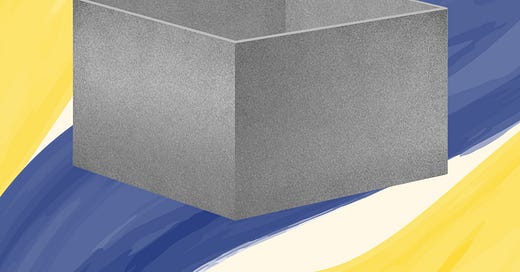Issue #87: IKEA, and the myth of compartmentalisation
Not everything fits into neat little boxes.
About once a year, when I’m feeling stressed, I take myself off to IKEA. The majority of people I tell this to deem it a strange antidote, suggesting that the experience of visiting IKEA is, in itself, quite stressful.
But perhaps the majority of people don’t know the joy of wandering around IKEA alone, embodying Main Character Energy (as the kids would say), with nowhere else to be, playing back-to-back podcasts while I lose myself in a long-held fantasy of mine. A fantasy where everything in my life is neatly packed into boxes.
Because they’ve got them all, folks. Big ones, small ones, ones that fold into an inoffensive little rectangle of velvety polyester and others, more substantial in shape, that are woven and decorative. There are stackable (stackable!) plastic ones in 50 shades of neutral – with thoughtful details like little handle-holds, or a dip in the middle for your rolled-up cleaning cloths.
And let’s not forget the Tupperware. Tupperware of all sizes, of all purposes – from teeny tiny plastic rectangles to hold, say, a sliver of smoked salmon, to large square ones made from glass, a non-carcinogenic container to hold leftovers from the family-sized tofu curry you made over the weekend.
It’s not just the purchasing of said containers – and you best believe I bought a fair few – that gives me so much joy. It’s what happens afterwards, when I bring them home. Cue, a declutter! An exorcism of the ‘everything but the kitchen sink’ drawer, a new zippable home for my bedding slid neatly under the bed, a portioning of everything hanging out loose in my fridge into neat, microwave-safe glassware.
There is, I admit, more to it than just the boxes. As I mentioned early, this annual trip tends to coincide with periods of stress; more specifically, periods where I feel out of control. When this happens, I struggle to mentally compartmentalise. My insecurity around, say, something I’m writing spills over into my love life (or vice versa?). Anxiety about the future turns into immediate money worries. A misunderstanding with a friend has a domino effect. I read a news story that haunts me for days. Professional stress manifests itself in domestic discord, so that my flat begins to resemble something dangerously akin to my teenage bedroom. The inside of my head, come to think of it, starts to resemble that mess – floordrobe included. And then I’m walking into Pret, and the decision of what sandwich to buy takes up to ten minutes – and, reader, it is usually not about the sandwich either.
When I feel this mental mess, it’s IKEA, and the subsequent process of ordering, clearing, compartmentalising, that makes me feel calmer, soothing me with a visible illusion (delusion, perhaps) that everything might soon have its place once again.
Some people excel at compartmentalising. One of the podcast episodes I listened to on the way around IKEA was an interview with Lindsay Nicholson, former editor of Good Housekeeping. Following a series of intense personal turmoil (the loss of her first husband and, subsequently, daughter from the same rare form of leukaemia), Nicholson continued to work, turning up visibly pregnant (with another, younger daughter) just after she’d lost her husband, and then taking just three weeks of maternity leave before returning to work.
‘My grief was so bad I needed that escape… There was nothing I wanted more than a challenge that would absorb every waking minute.
Bottling our feelings up is wrong, so we’re told – hopefully by our parents and therapists but, failing that, certainly by our most lauded Americans.
And yet it’s hard not to listen without a tinge of admiration for what Nicholson did over those stoic, resilient years, throwing herself into work and turning Good Housekeeping’s dwindling readership figures into the green. Nicholson is ambivalent about the relentless work ethic – and, no doubt, fierce compartmentalising – that carried her through. On the one hand, she describes the workplace as her ‘safe space’ and a ‘refuge’. For 8-10 hours a day, I could be a normal person, she tells host
. However, she details movingly how this compartmentalisation did come to affect her later down the line, in the form of a nervous breakdown. Clearly, there are limits.The outside expectation to ‘compartmentalise’ isn’t always a bad thing.
Keep reading with a 7-day free trial
Subscribe to The Shoulds by Francesca Specter to keep reading this post and get 7 days of free access to the full post archives.





